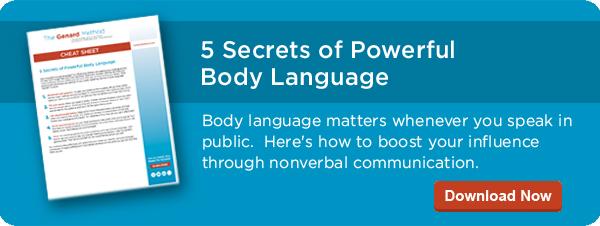How focused are you in speeches and presentations when you need to come across at your best?
You may be an expert in your field. You may even know your audience intimately. But can you let every consideration fall away except this one: paying attention to whether your critical message is getting through to your listeners?
(One important consideration is feeling confident. To do so, download my free cheat sheet on "How to Calm Your Nerves Before Speaking.")
Anxious speakers in particular have a hard time losing themselves in their message. Instead, their self-consciousness and feelings of vulnerability keep their attention directed inwardly. Rather than keeping their eye on the prize—their audience's receptivity to their message—they look back at themselves, wondering how they're doing. In the moment when they need to aim their attentiveness most precisely, they miss the mark by a mile.
If your own focus isn't what it should be while speaking, here are five reasons you need to "strengthen your focus muscle." The good news is that doing so will improve both your effectiveness and enjoyment of public speaking.
Strong Focus Creates Presence and Mindfulness
We frequently hear about "stage presence" and why you need it as a speaker. It's true that possessing presence eases your task when it comes to influencing an audience. But it's not as mysterious a quality as some people think.
More than anything, "presence" simply means being present. Too many speakers aren't really present for their audience because they're nervous about their performance and so are judging themselves as they speak. Leaders, on the other hand, know how to control the speaking situation. Learn "10 Ways to Stay Fully Focused when Speaking."
The truly effective speaker is one who practices mindfulness, which means fully occupying the present moment, the "here and now." That's the speaker who makes the most of the situation for both himself or herself and the audience. And isn't it interesting that "presenter" and "presentation" also contain that magic word "present"? For an introduction to mindfulness, read Thích Nhất Hạnh's book The Miracle of Mindfulness.
Focus Aids Your Conciseness
Recently, I spent an entire day shooting videos for my company's new web site. I worked with a script, and then it was time to answer questions on camera about the techniques I use in my speech coaching and training. It took almost the whole day to set up the scripted video shots, so when it was time to explain my techniques, I was very tired, and so I rambled.
My physical state made me lose focus when I still needed a lot of that valuable commodity. When we're too focused on our own performance, or are distracted, or are overly concerned with whether others are judging us (or are merely tired), our performance suffers. A focused mind is one that can deliver a message with maximum conciseness.
Focus Helps You Think on Your Feet
Does any situation where staying mentally sharp and thinking on your feet matter more than public speaking? Too often speakers can't stay attuned in this way, and find themselves saying, "I wish I could focus on what I'm here to say!"
Our own intuition is usually a pretty reliable guide to how we're doing as speakers. We know when we're clicking on all cylinders, or not. Of course, it's in these high-stress moments when our focus is most likely to abandon us. The question-and-answer period of your presentation is when you may feel this most acutely, because by definition you can't tell which questions will be coming your way. Cultivate staying focused at this moment, since your talk isn't over yet by a long shot.
Focus Fosters Rapport with Your Audience
Your effectiveness with an audience depends more on your rapport with listeners than the information you're intent on delivering. Content can't live on its own (if it could, we'd just email everyone a copy of our speech!).
Audiences need to feel they're in good hands; and they certainly want to view you as a credible speaker. For these reasons, they want to have a positive relationship with you. From your side, this means expending the right kind of energy, i.e., focusing as strongly on your listeners as your material. You also need to watch your audience's body language closely, so you can tell if you need to shift gears to aid understanding. That too requires discipline and focus.
Focus Helps Reduce Your Anxiety
When public speaking creates anxiety for you, it's often because you feel that the situation is out of your control: you'd like to be focused and effective, but you're just too concerned with how things aren't going the way you wish they would.
In these situations, you're only "half there" for your audience. By improving your focus, you'll be able to rest assured that you're taking care of the matter at hand. Then you'll feel you're in exactly the right place rather than someplace where you'd rather not be. By focusing your physical energy as well, you'll be reducing the effect of stress hormones that your body is producing. You could say you'll be producing a marriage of convenience between your mental and physical selves.



